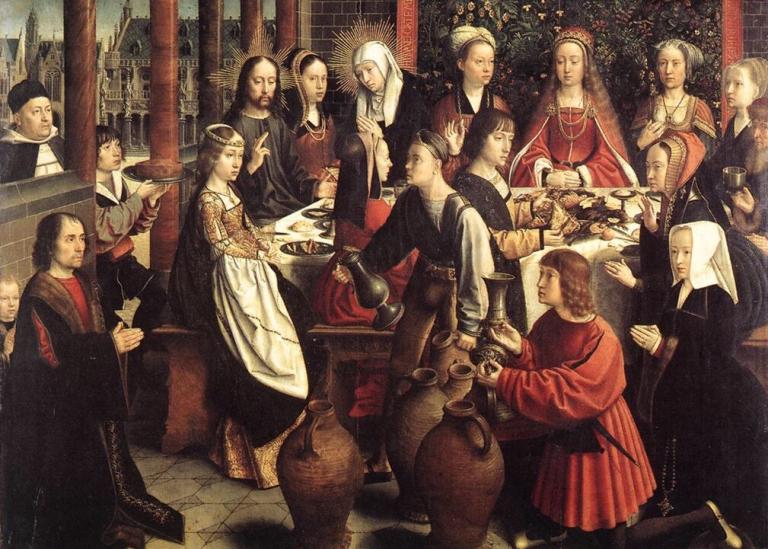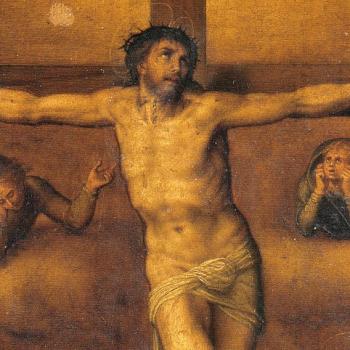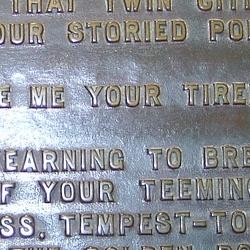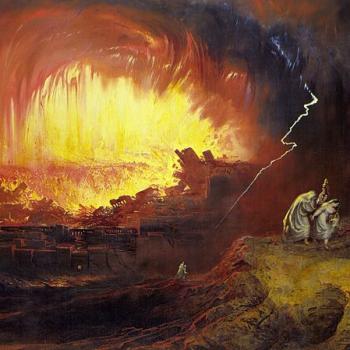Dr. Candida Moss—who is still permitted to teach at Notre Dame, to no one’s great surprise, least of all mine—is all wrought up over the LDS “half-hearted shuffle toward LGBT equality.” (I think she left out Q and A.) Dr. Moss prefers the mad dash over the cliff: When she says “LGBT equality,” what she means is “marriage equality,” in spite of the fact that no one, not even Dr. Moss, believes in any such thing. Would she advocate marrying your dog? a three-year-old child? the exhumed body of King Tut? So let us get this myth of “marriage equality” out of our heads from the start. To define marriage is to limit it, and the real goal is not marriage “equality” but marriage plasticity. I have said all this before.
So why does Dr. Moss think that the Mormon church has taken only a “half-hearted shuffle”? Let’s take a look. All this is out of her article yesterday in the Daily Screech.
In a rare press conference in Salt Lake City on Tuesday, LDS leaders announced that they would endorse [“equality”] legislation on the condition that it also protected the rights of religious groups.
Oh, I see. So wanting religious groups to be protected counts as “half-hearted”; I think I see where Dr. Moss is coming from in all this. She cites three bills still pending before the Oklahoma legislature, which in her view show that “the culture wars are not over.” (Because those who are opposed to the destruction of marriage via plastic definition should just shut up and go away. Rights for religious groups? foh!) But, says Dr. Moss, there is hope.
[T]his last gasp of the religious right’s campaign against same-sex marriage depends on an understanding of what constitutes “tradition” that is, in fact, [Here’s her key point.] not particularly traditional.
The Yale-educated Dr. Moss seems not to have a very original, historical, or careful mind. Such claims—that the so-called “religious right” is taking its “last gasp”—have been around for some time. Every gasp it has ever took, it seems, has been its last one; it never took a first one. “Last gasp” is a particularly crude and reflexive cliché, used by those who want to dismiss an idea without actually engaging or refuting it. And for Dr. Moss to lump all opponents of same-sex “marriage” into the “religious right” only shows that she hasn’t given much thought to the wide variety of people who oppose same-sex “marriage.” They are not all from the “religious right.” Dr. Moss uses that expression only as a label and a cudgel, without reference to any actual meaning it might have.
But her real point, in all this, is to challenge opponents of same-sex “marriage” by claiming, once more, that the traditional definition is not biblical. Now, that is not at all original on the part of the Notre Dame professor with the Yale degree—it is part of the common coin of anti-Christian propaganda—but let us go through what she says nonetheless. It is well to show why the claim is false.
***
Dr. Moss writes:
In the Old Testament, marriage is quite clearly defined as a relationship between a man and a woman, a man and several women, a man and his fertile slave girl, and a man and his rape victim.
So see! you can define marriage however you want to. One man and one woman is just not biblical! That is what we are meant to conclude. Well, you would think that Dr. Moss—remember, her degree is from Yale; she teaches at Notre Dame: remember that—would be able to cite some scholarly source, some work of critical exegesis, some interaction with the relevant biblical texts, to back this up. Right?
But no. She cites this article, also in the Daily Screech! The article was written by Dr. Joel Baden; he is a professor of Old Testament at Yale Divinity School. Dr. Baden, castigating “the prophet Santorum” (is that not just how we would expect a Yale professor to write?), claims that polygamy is the Bible’s “ultimate family value.” Oh. Well, surely he cites a biblical text, right? The article is categorized under “exegesis”; surely there’s some exegesis in the article, right? Right?
But no. Dr. Baden does allude to some biblical texts, in the most casual and offhand way (he doesn’t quote the exact text or give an actual citation), but not once does he engage in any actual exegesis, or even the most superficial interaction with the text.
So I am going to do what Dr. Moss and Dr. Baden fail to do. I am going to go to the actual text and see whether, anywhere in the Old Testament, marriage is defined or limited. And I am going to look at those texts that people often cite to try to back up claims such as the ones these two very eminent theologians and biblical scholars make.
I. Incest. Sarah was Abraham’s half-sister (Gen. 20:12). Rebekah was Jacob’s first cousin (Gen. 29:12-14). Amram (Moses’ father) married his aunt Jochebed (Exod. 6:20).
Now, incest, according to Black’s, is: “sexual intercourse or cohabitation between a man and woman who are related to each other within the degrees wherein marriage is prohibited by law.”
So what we find in these kind of examples is not that marriage is somehow defined differently, but that incest is defined differently. These texts do not tell us what marriage is or is not, but what incest is or is not. Marriage is still a man and a woman, the only question is: may I marry this woman?
But no one who brings any of this up ever cites Leviticus 18:6-18. In that text, the Mosaic law forbids sexual relations with “any that is near of kin.” “Near of kin” here includes a parent, a sister, a half-sister (sorry, Abraham), a grandchild, an aunt or uncle, a daughter-in-law or son-in-law, a sister-in-law or brother-in-law, or a step-relation.
Leviticus does not mention first cousins, suggesting an addition to the definition of incest (not marriage) that came later, although some states today do permit it.
So the Mosaic law constrained what the patriarchs had done. What this tells us is that we should never pick out an example of something someone did and claim thereby that God allows it.
II. Polygamy. Lamech married both Adah and Zillah (Gen. 4:19). Jacob also had two wives, Leah and Rachel (Gen. 29). King David had multiple wives (1 Sam. 25:43).
Now here again, we still find marriage between men and women, the only question being, in this case, how many? And once again, we find that the Mosaic law expressly prohibits polygamy (Leviticus 18:18). Some translations render the text as though it were simply a prohibition against marrying your wife’s sister while your wife is still living. But the Hebrew word in question is אֲחֹתָ֖הּ, achotah, which simply means “another,” so that the correct translation would be something like: “Neither shalt thou take another wife, to uncover her nakedness, while your wife is still living.”
So if Jacob and Moses and David had multiple wives (and Solomon too—see 1 Kings 11), we can hardly conclude that God approved of such a practice.
III. Slave girls. The text that usually gets cited as a Mosaic sanction of this is Exodus 21:7-11.
And if a man sell his daughter to be a maidservant, she shall not go out as the menservants do. If she please not her master, who hath betrothed her to himself, then shall he let her be redeemed: to sell her unto a strange nation he shall have no power, seeing he hath dealt deceitfully with her. And if he have betrothed her unto his son, he shall deal with her after the manner of daughters. If he take him another wife; her food, her raiment, and her duty of marriage, shall he not diminish. And if he do not these three unto her, then shall she go out free without money.
Now, this is a difficult passage, but the first important thing to remember here is that, once more, this is not some different understanding of marriage than one man and one woman. So for Dr. Moss to present in that context is misleading. Where there is difference with the normal practice of marriage today, it involves different customs about (1) slavery; (2) how marriage is contracted. With that in mind, what is striking about this passage is not that “slave marriage” occurred, but instead how the practice was regulated by Mosaic law in order to protect the woman.
- If his betrothed did not please her master, he was to return her to her father. He could not sell her off to someone in a foreign land and profit by it.
- If the master decided she should be given to his son instead, he was to not to take her simultaneously for himself. He must treat her as his own daughter, not as his wife.
- If he marries another wife, she (the “slave”) is not to lose anything that is rightly hers under a marriage contract.
- If he does not provide her with what she should have by right, she is to go free and return to her father.
So the most we can conclude from this text is that the Mosaic law tolerated a particular practice, but regulated it so as to ensure the rights and just treatment of the woman in question. The entire text is about what her master must do for her, what rights he must assure her, and his duty to not “deal deceitfully with her.” The woman is to be protected, not misused. She has rights; he may not treat her as he wishes.
IV. Rape marriage. In this case, the text most often cited is Deut. 22:28-29.
If a man find a damsel that is a virgin, which is not betrothed, and lay hold on her, and lie with her, and they be found; then the man that lay with her shall give unto the damsel’s father fifty shekels of silver, and she shall be his wife; because he hath humbled her, he may not put her away all his days.
Of course, one can hardly find an approval of rape in this. It might be shocking to our sensibility to think that a woman would be married by her rapist. But there are three key points to be made here. The first is that the text clearly affirms that rape is violation. The Hebrew word that the KJV translates “humbled” is עִנָּ֔הּ, innah. It is best translated “violated.”
The second is that, since she is unbetrothed, the woman remains under her father’s authority. Those who cite Deuteronomy must not fail to mention Exodus 22:16-17.
And if a man entice a maid that is not betrothed, and lie with her, he shall surely endow her to be his wife If her father utterly refuse to give her unto him, he shall pay money according to the dowry of virgins.
The right parallel to our own culture, in which women make their own choice who to marry, is that the woman is free not to marry her rapist. Imagine if our courts, in addition to whatever other punishment they meted out to a rapist, required him to pay her a dowry, marriage or no marriage. That would be the parallel Dr. Moss is looking for.
In fact—third point—the Mosaic law was designed to remove any incentive to rape by making a rapist financially obligated to the woman. He is to provide for her as he would a wife.
So once more, this text has nothing at all to do with a definition of marriage, but instead with a code governing the legal obligations of a rapist toward his victim.
Now, I can only guess that Dr. Moss has passages like these in mind when she attempts to refer to the Old Testament definition of marriage: for she does not cite a single text. If she has other texts in mind, and they contradict what I have said, I hope she would mention them in some future article for the Screech. I had thought that that was the kind of thing that biblical scholars do, as a matter of course. I don’t think there’s anything in her published works about this; her vita lists a lot of books and articles about martyrdom and disability, but nothing about marriage in the Bible. Perhaps I’ve overlooked it. As for Dr. Baden, he has published a number of works on the Documentary Hypothesis. But there is nothing about marriage from him either, unless you count his perfunctory article in the Screech. Perhaps Yale needs to update its faculty Web site, if that is not so.
***
Next, Dr. Moss says that Jesus never once spoke in favor of marriage. The claim is just astonishing. There is no other way to put it. Dr. Moss does not mention Matt. 19:3-9, so there is no telling what she would make of it.
The Pharisees also came unto him, tempting him, and saying unto him, Is it lawful for a man to put away his wife for every cause? And he answered and said unto them, Have ye not read, that he which made them at the beginning made them male and female, and said, For this cause shall a man leave father and mother, and shall cleave to his wife: and they twain shall be one flesh? Wherefore they are no more twain, but one flesh. What therefore God hath joined together, let not man put asunder. They say unto him, Why did Moses then command to give a writing of divorcement, and to put her away? He saith unto them, Moses because of the hardness of your hearts suffered you to put away your wives: but from the beginning it was not so. And I say unto you, Whosoever shall put away his wife, except it be for fornication, and shall marry another, committeth adultery: and whoso marrieth her which is put away doth commit adultery.
Here we have a clear twofold definition of marriage: (1) It is between one man and one woman; (2) it is permanent. Can Christ, who said those things, and who told us that the joining together in marriage is the work of God, have been “not down” with it? He could have said, if he had wanted, “I say there will be no more marriage.” But he did not say that; Dr. Moss seems to be confusing Christ with Hamlet.
So rather than deal with Matt. 19:3-9, or Mark 10:2-12, Dr. Moss decides to make the following bizarre claims.
I. The Wedding Feast at Cana does not show that Jesus supported marriage, only drunkenness and partying. Well, I guess that makes a kind of sense, if you are inclined toward reductio ad absurdum. The Pharisees also accused Jesus of being a glutton and a drunk. A less jaded way to read the passage would be to say that, in Christ’s view, marriage is such a high good that a wedding is an occasion of celebration and joy.
II. Marriage no longer exists in heaven (Matt. 22:30), so Jesus could not have thought all that much of it. Dr. Moss does not seem to consider the possibility that marriage does not exist in heaven because the reasons God made it do not apply there. God made it for the procreation and care of children, and also for the union between man and woman. These are only figures of the ultimate union between redeemed humanity and God.
But Dr. Moss also does not mention that Christ will return for His bride the Church. His Second Coming culminates in the wedding feast of the Lamb (Rev. 19:7-10). It hardly seems accurate to say that Christ is “not down with marriage” if salvation history ends with a wedding feast in which Christ himself is the bridegroom.
III. In Mark 10:29-30, Jesus promises hundredfold rewards to those who have left family “for my sake and the gospel’s.” It is a dubious passage to cite, since the point Jesus is making here is that God (He is God) and the gospel are pre-eminent above all other things and all other bonds of obligation. That is not a rejection of marriage, only a statement that Christ’s claims on us are higher than any other.
IV. Jesus was a “home-wrecker” because some of his disciples were married and yet left their wives for a “three-year fishing trip.” Well, this wasn’t a “fishing trip,” Dr. Moss; that’s just an absurd and ignorant and patronizing thing to say. But is the U.S government a home-wrecker because it can call men away from their families for military conscription? Perhaps you might say that a military conscription is an extraordinary event. Just so. It’s also an extraordinary event when God comes to earth to redeem us from our sins. I’d say that’s an even more extraordinary event than a military conscription, since conscriptions happen many times but the Incarnation happened once. Jesus is not a home-wrecker, Dr. Moss; He’s God.
V. St. Paul says that he prefers celibacy, but that it is better to marry than suffer the flames of Hell due to an inability to remain celibate (1 Cor. 7:8-9). What Dr. Moss fails to mention here is that St. Paul—by his own admission—is only telling us his preference. This is not (1 Cor. 7:6) a commandment. In other words, Paul admits to a flaw in his own thinking on the point. It is indeed better to marry than to burn, but it is not better to remain celibate than to marry. Dr. Moss does not consider the full text, which says no such thing as she tries to make it say.
Dr. Moss ends with a few words about “the Christian tendency to reject marriage.” In the early centuries of the Church, that was no doubt true. But she does not mention a key point of historical context here, which is that many of the first Christians were convinced that end of the world would come in their lifetime. They discerned that weightier ends than marriage needed to be looked to.
***
Dr. Moss leaves several points unexplained, even assuming her reading of the Bible to be accurate.
First, if we see examples of incest and polygamy, slave-marriage, and rape-marriage in the Old Testament, not once do we find marriage between two men or two women. So to use the one as justification for the other makes little sense. It’s one big non sequitur. The Old Testament nowhere suggests that two women or two men may marry. The only question is over who, among women, a man is free to marry. The Mosaic law makes clear that incest and polygamy are unlawful.
Second, even if, in the New Testament, we find Jesus and Paul being “not down” with marriage, that hardly provides a warrant to suggest that one may marry anyone he likes. Would it not rather, suggest just the opposite?
So even if the biblical evidence were to suggest that the one man-one woman definition of marriage is wrong (and it does not), in no way does that lend support to the definition that Dr. Moss wants us to embrace.
But when the biblical text is looked at, and with care, one finds that it upholds the very definition of marriage, and the high doctrine of marriage, that same-sex proponents seek to undermine.
***
If you like the content on this blog, your generous gift to the author helps to keep it active. I remember all my supporters in my Mass intentions each week.













